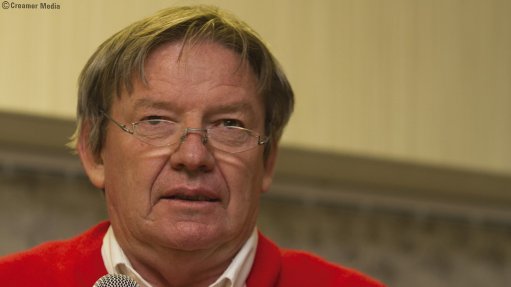
BLSA chairperson Bobby Godsell
Photo by: Duane Daws
Business Leadership South Africa (BLSA) has praised Goldman Sachs’ ‘Two Decades of Freedom’ economic report as a “constructive contribution to South Africa’s economic policy dialogue”.
By demonstrating how post-apartheid governments wrestled the country back from the brink of bankruptcy, dismantled the race-based economic exclusion of the past, and enabled the significant creation of wealth which raised South Africa’s gross domestic product from $136-billion in 1994 to $380-billion, the report underlines the significant achievements the country has made in a relatively brief period, BLSA chairperson Bobby Godsell said in Johannesburg.
“At the same time, the report is blunt and clear about the threats to consolidating these considerable achievements and thus provides a useful, evidence-based contribution for sustaining the creation of inclusive wealth.”
“In order to preserve the substantial gains of democracy, we need to build on the things we got right, operate from an informed understanding of the challenges that we still face and cooperate through a flexible framework that pulls on the resources and skills of the country as a whole,” BLSA CEO Thero Setiloane said.
The National Development Plan (NDP) recognises that long-term growth and investment requires trust and cooperation between business, labour and government, and acknowledges that levels of trust in South Africa are low, he added.
“We welcome the call in this report for a ‘team South Africa approach’, as it is only through collaboration between government, business, labour and civil society, all pushing in the same direction, that the challenges we face can be addressed.”
The joint government–business process to identify and resolve constraints to growth, initiated by the meeting between business leaders and President Jacob Zuma and members of his Cabinet in February and again in August, was an encouraging example that such engagements were possible.
Five working groups are making good progress on both identifying constraints and ways of addressing these in the areas of infrastructure, regulations, inclusive growth, education and skills and labour relations, all areas that the Goldman Sachs report identifies as critical. Another example is the now operational National Education Collaboration Framework, which has also identified five areas of joint action to improve the quality of basic education.
Critical to this, as identified by the report, is the need for a new model of labour relations, one which recognises the need for wage moderation at all levels, including some sacrifices by management, alongside increases in productivity when wages do rise.
“While the challenges that we face are significant, we as South Africans rose to much more difficult challenges to ensure a peaceful and constructive end to apartheid. A new generation of leaders must now rise to the challenges identified in this report, and described in much greater detail in the NDP, to build a better future for both current and future generations," concluded Godsell.
Download the Goldman Sachs report above